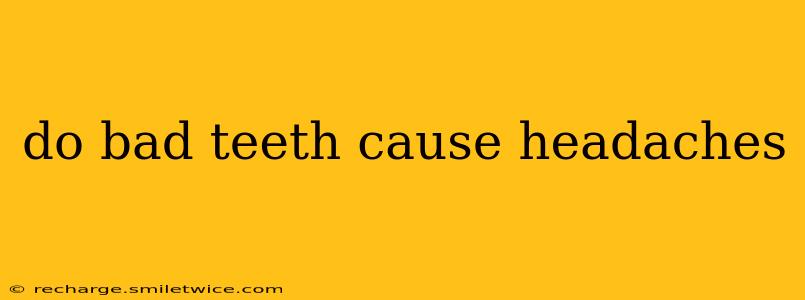Many people experience headaches, and while stress and dehydration are common culprits, the source can sometimes be surprisingly close to home: your teeth. The connection between bad teeth and headaches might not be immediately obvious, but the link is real and often overlooked. This comprehensive guide explores the relationship between poor oral health and headaches, answering common questions and providing valuable insights into this often-missed connection.
How Can Bad Teeth Lead to Headaches?
The most common pathway between dental problems and headaches involves the temporomandibular joint (TMJ). This joint connects your jaw to your skull, and problems in this area, often stemming from teeth grinding (bruxism), misaligned bites (malocclusion), or damaged teeth, can lead to TMJ disorders (TMD). TMD can cause significant pain that radiates to the head, temples, and even the neck and shoulders, often manifesting as headaches.
The pain isn't always directly from the jaw joint itself. Inflammation, muscle spasms, and referred pain—pain felt in one area originating from another—play a significant role. For example, a severe toothache can trigger pain signals that the brain interprets as originating in the head, resulting in a headache.
What Types of Headaches Can Bad Teeth Cause?
The type of headache associated with dental issues varies, but the most common are:
- Tension Headaches: These are often characterized by a dull, aching pain that feels like a tight band around the head. They are frequently linked to stress, but TMJ problems can exacerbate them.
- Migraines: While not directly caused by bad teeth, dental problems can trigger migraines in susceptible individuals. The jaw pain and muscle tension associated with TMD can act as a migraine trigger.
- Sinus Headaches: While often confused with other headaches, sinus pain can sometimes be misdiagnosed. Underlying dental problems, like infections, can exacerbate or even mimic sinus headaches. Proper diagnosis by a medical professional is crucial here.
Can a Tooth Infection Cause a Headache?
Yes, a tooth infection (abscess) can absolutely cause a headache. The infection causes inflammation and pressure buildup within the tooth and surrounding tissues. This pressure can stimulate pain receptors, leading to throbbing pain that radiates to the head, often mimicking a sinus headache or a more generalized head pain.
Can Teeth Grinding Cause Headaches?
Yes, teeth grinding (bruxism), often done unconsciously during sleep, is a major contributor to headaches. The constant pressure and grinding wear down tooth enamel, causing pain and potentially leading to TMJ disorders. The resulting muscle tension and jaw pain are significant headache triggers.
How Can I Tell if My Headaches Are Related to My Teeth?
Identifying whether your headaches stem from dental issues requires a thorough assessment by both a dentist and potentially a physician. Pay close attention to the following:
- Jaw Pain: Do you experience pain or stiffness in your jaw, particularly when chewing or opening your mouth wide?
- Facial Pain: Does the headache affect your face or temples?
- Pain with Chewing: Does chewing food aggravate your headache?
- Clicking or Popping in Your Jaw: Do you hear clicking or popping sounds when you move your jaw?
- Tooth Sensitivity: Do your teeth feel unusually sensitive to hot or cold?
If you suspect a link between your headaches and your teeth, consult your dentist for a checkup. They can assess your teeth, jaw, and bite for any underlying issues. In some cases, referral to a specialist, such as an orthodontist or oral surgeon, might be necessary. A physician may also be consulted, particularly if other symptoms are present.
What Can I Do to Prevent Headaches Caused by Bad Teeth?
Prevention is key. Regular dental checkups are crucial for maintaining good oral health and preventing dental problems that could lead to headaches. Additionally:
- Manage Stress: Stress contributes to teeth grinding, so managing stress through techniques like yoga, meditation, or exercise is beneficial.
- Maintain Good Oral Hygiene: Brush and floss your teeth twice a day.
- Wear a Night Guard: If you grind your teeth, a night guard can protect your teeth and reduce jaw muscle strain. Your dentist can help with custom-fitting.
- Seek Professional Treatment: Address any existing dental issues promptly.
By proactively addressing dental health and seeking appropriate medical attention when needed, you can significantly reduce the likelihood of experiencing headaches stemming from dental problems. Remember, early intervention is always the best strategy.
